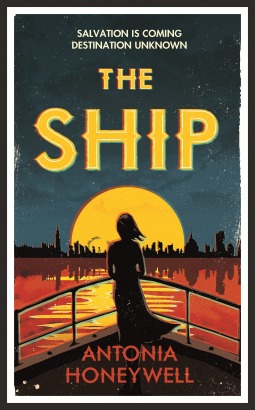
On her sixteenth birthday, after Lalla’s mother is fatally wounded by a shot through the window of their flat, Michael takes his daughter to set sail for a better life. Initially, Lalla’s unhappiness is attributed to her grief at her mother’s death, exacerbated by her father’s insistence that those on board should renounce all ties to the past. Even her developing passion for football-coach Tom cannot prevent her unease at what is happening. The other passengers, selected on the basis of their generosity to others or resistance to the military regime, see Michael as a Messiah figure and are increasingly frustrated by his daughter’s apparent rejection of his largesse.
The ship doesn’t provide its passengers with merely the basics but, like the Garden of Eden (apart from the lack of soil and plant life), it’s replete with everything they might require. Yet it is this very opulence that so horrifies Lalla: not only have they taken resources that would have met the needs of a much wider population for much longer but, as with any closed system, it can only stagnate (p143):
We were not creating, we were simply existing, building lives upon the flotsam and jetsam of something that had gone. We were not finding new ways to live. We were living in accordance with some ideal of a former age, which we saw in films, read of on our screens, but no longer knew or understood.
Michael’s daughter is particularly vulnerable to seeing past the idyll to the hopelessness that underlies it because she alone has not been selected for the ship, nor has she undergone extreme hardship to get there. Moreover, Michael has established the community on the ship out of his love for her. Yet, naive as she is in many ways, Lalla understands that she cannot become herself without separating from her father, an impossibility on the claustrophobic ship. Thus the doctor’s advice to her must feel dreadfully painful (p224):
Skip the bit of your life where you have to rebel and go straight to the part where you embrace what your parents have done for you. Skip the part where you throw everything away and cut straight to being happy.
One of the many pleasures of reading this novel was continually making links to other novels and blog posts I’ve enjoyed: Michael’s notion of abolishing time reminded me of a discussion with Norah Colvin; Lalla’s creation of her own museum of Station Eleven; her mother’s death of Academy Street; and living on a boat in extremis of The Surfacing. Regular readers of this blog, and followers of the Carrot Ranch, might also recognise the themes of weltschmerz and misplaced meliorism in Michael’s attempt to save his daughter from an imperfect world. The issues seem so relevant in so many ways, so that I’m only half joking when I’ve headed this post: The meaning of life.
I received my copy courtesy of the Curtis Brown book group: thanks to them, fellow members and the author herself for an interesting discussion at the end of last month. Because of this, I didn’t invite Antonia Honeywell to an annethology Q&A, but, if you’d like to delve deeper into the ideas behind the novel, I strongly recommend this interview with Rebecca Mascull (author of The Visitors).





















 RSS Feed
RSS Feed





















